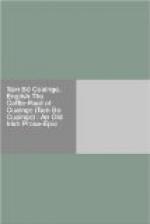As a considerable part of the Tain is occupied by connecting episodes with place-names, an explanation of some of the commonest elements in these may be of use to those who know no Irish:
Ath=a ford; e.g. Ath Gabla (Ford of the Fork), Ath Traiged (Ford of the Foot), Ath Carpat (Ford of Chariots), Ath Fraich (Fraech’s Ford), etc.
Belat=cross-roads; e.g. Belat Alioin.
Bernas=a pass, or gap; e.g. Bernas Bo Ulad
or Bernas Bo Cuailnge
(Pass of the Cows of Ulster, or of Cualnge).
Clithar=a shelter; e.g. Clithar Bo Ulad
(shelter of the Cows of
Ulster).
Cul=a corner; e.g. Cul Airthir (eastern corner).
Dun= a fort; e.g. Dun Sobairche.
Fid=a wood; e.g. Fid Mor Drualle (Great Wood of the Sword-sheath).
Glass=a brook, stream; e.g. Glass Chrau
(the stream of Blood),
Glass Cruind, Glass Gatlaig (gatt=a withe, laig=a
calf).
Glenn=a glen; e.g. Glenn Gatt (Glen of the
Withe), Glenn Firbaith
(Ferbaeth’s Glen), Glenn Gatlaig.
Grellach=a bog; e.g. Grellach Doluid.
Guala=a hill-shoulder; e.g. Gulo Mulchai (Mulcha’s shoulder).
Loch=a lake; e.g. Loch Reoin, Loch Echtra.
Mag=a plain; e.g. Mag Ai, Mag Murthemne, Mag Breg, Mag Clochair (cloch=a stone).
Methe, explained as if from meth (death); Methe Togmaill (death of the Squirrel), Methe n-Eoin (death of the Bird).
Reid, gen. Rede=a plain; e.g. Ath Rede Locha (Ford of Locha’s Plain).
Sid=a fairy mound; e.g. Sid Fraich (Fraech’s Mound).
Sliab=a mountain; e.g. Sliab Fuait.
I need perhaps hardly say that many of the etymologies given in Irish sources are pure invention, stories being often made up to account for the names, the real meaning of which was unknown to the mediaeval story-teller or scribe.
In conclusion, I have to express my most sincere thanks to Professor Strachan, whose pupil I am proud to be. I have had the advantage of his wide knowledge and experience in dealing with many obscurities in the text, and he has also read the proofs. I am indebted also to Mr. E. Gwynn, who has collated at Trinity College, Dublin, a number of passages in the Yellow Book of Lecan, which are illegible or incorrect in the facsimile; and to Dr. Whitley Stokes for notes and suggestions on many obscure words.
LLANDAFF, November 1903.
THIS IS THE CATTLE-RAID OF CUALNGE
I
A great hosting was brought together by the Connaughtmen, that is, by Ailill and Medb; and they sent to the three other provinces. And messengers were sent by Ailill to the seven sons of Magach: Ailill, Anluan, Mocorb, Cet, En, Bascall, and Doche; a cantred with each of them. And to Cormac Condlongas Mac Conchobair with his three hundred, who was billeted in Connaught. Then they all come to Cruachan Ai.




